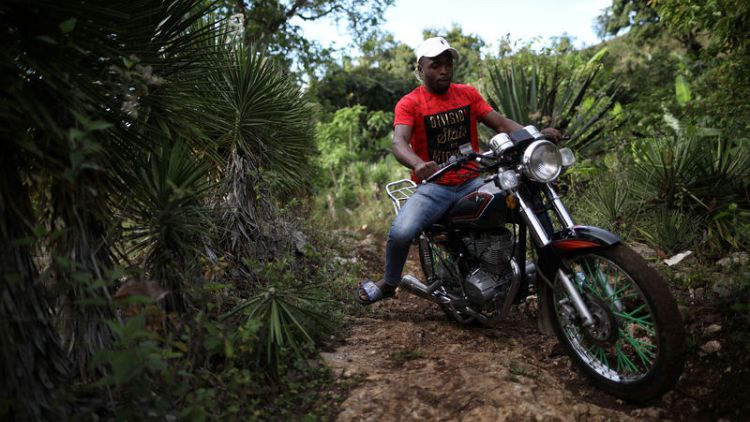By Andres Martinez Casares
BOUCAN FERDINAND, Haiti (Reuters) - Near the bottom of the island of Hispaniola in southeast Haiti is a forgotten village, cut off from its own country, and slowly emptying as its residents leave for the neighbouring Dominican Republic.
Without health services, electricity, or paved roads, Boucan Ferdinand lost its only road to the nearest Haitian town, Bois Negresse, in devastating floods back in 2004.
Some of its residents have left for the Haitian capital of Port-au-Prince and others cling on to a precarious life. Many have crossed illegally into the more prosperous Dominican Republic.
"They do not have access to basic social services, this situation is at the root of the mass migration to the Dominican Republic," said Jean Gilles Viola, mayor of the municipality that governs Boucan Ferdinand and around 20 other villages.
Those who remain live in thatch and stick hovels, collecting rainwater to drink and at constant risk of infectious diseases.
Some children, in impeccable blue uniforms, walk to a school in the town of Chapotin - a trip that takes an hour and a half over a narrow path, impassable in the rainy season.
In the village are two makeshift classrooms, run by the Baptist and Catholic chapels.
"This year my children will not go to school," said village farmer Wilber Jean in October, as his children played nearby.
"Here you pay a ton. There," pointing across the border, "the president pays."
Children collect firewood or graze small flocks of goats and sheep to help their parents. During planting time, many skip school in order to help on the farms, earning less than $2 a day.
In the mornings, the village smells of burning firewood brought by the children as the women make breakfast: sometimes there is pasta, but more likely coffee and a piece of bread. Often there is rice and beans. Meat, a luxury.
Haiti, which according to the World Bank is the poorest country in the Americas, has not recovered from a powerful earthquake that hit it on Jan. 12 2010, leaving more than 200,000 dead.
The countryside has been emptying out. Less than half of Haitians live in rural communities compared to 84 percent in 1960, World Bank data shows.
Boucan Ferdinand seems to have fallen off the map. Radios mainly capture Dominican signals.
"I'm tired of looking for stations in Haiti," complained Polo, a 64-year-old man who returned here with his wife and one of his grandchildren after spending more than 40 years in the Dominican Republic.
Aurana Augustin 'Timatant' sold bread and sweets until a few months ago when the left half of her body was paralysed. Today, the grandmother spends her days lying in bed.
The nearest Haitian health centre is across a mountain, so she has been crossing the border on a mule to seek care in the Dominican town of Duverge.
The local government wants to rebuild the road taken out by the floods but lacks the financial means, said the mayor.
Photo essay here https://reut.rs/2D0xVmW
(Reporting by Andres Martinez Casares, Additional reporting by Cheslie Jean Baptiste, Editing by Rosalba O'Brien)
